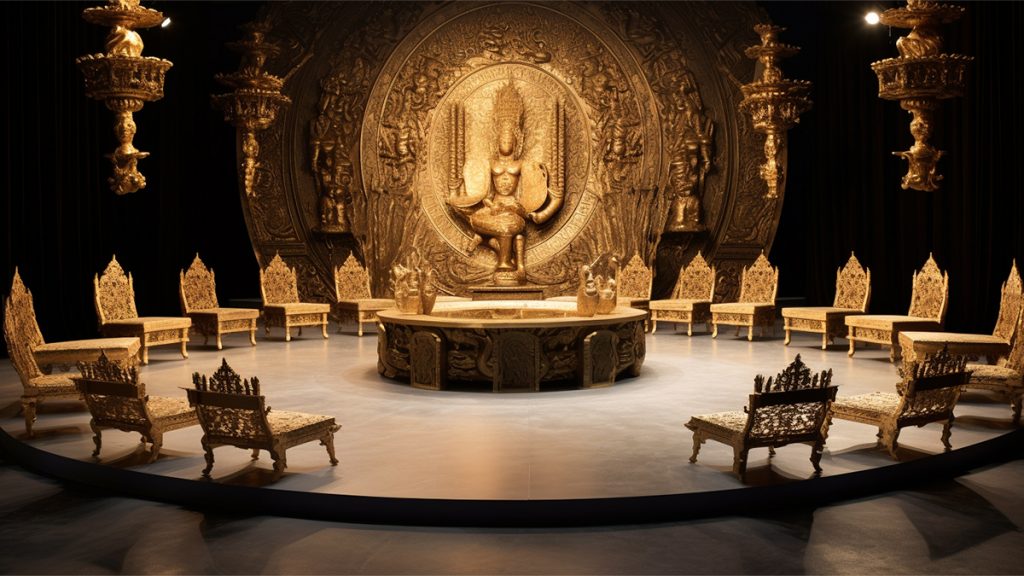From the onset of Arcadian history, a mysterious rhythmic pulse marked the passage of time – the Sokaris. This enigmatic festival, held every nine years, was dedicated to the Arcadian gods and soon became the cornerstone of Arcadian culture, with a profound significance that echoed through generations.
The Sokaris festival has its roots in the early years of Arcadian civilization, a period where spirituality and mythology were profoundly interwoven into the fabric of society. The festival was not a spontaneous cultural occurrence but rather a strategic enactment of a divine mandate – a celestial pact ordained by the gods seated on Olympus and embraced by Arcadian society.
The inauguration of Sokaris is deeply tied to the influential figures of that time, particularly Kempe, a revered deity who held a central role in the creation of the Arcadian world. After creating the world, Kempe yearned for tranquillity and sought to harmonize the world, fostering unity among the realms and coherence amidst the diversity that characterized the nascent world.
The vision for the Sokaris festival emerged from Kempe’s divine desire. He shared his aspirations with the other 18 gods in Olympus and the spiritual leaders of the early Arcadian society – the priests, prophets, and oracles who held sway over the Arcadian’s beliefs. Concurrently, the aristocracy, the temporal counterpart to the spiritual leaders, also played an instrumental role in conceptualizing the festival. Their objective was twofold: To honor the gods and procure their blessings, and to engender a sense of unity and collective identity within the diverse Arcadian society.
Thus, the first Sokaris festival was initiated, a grand spectacle where every realm journeyed to the Aristocrat’s Castle to offer their sacrifices. It was more than a religious rite; it was a unifying event that transcended societal differences and fostered a common Arcadian identity.
The festival’s central ceremony involved nineteen gilded chairs, symbolizing the nineteen gods of Olympus (though twenty-one gods exist in Lootverse, this figure excluded Udrar, the God of Wrath, and Niefel, the Goddess of the Underworld. They were not deemed worthy of being celebrated because of the role they played in the death of Einvaldi, the God of Existence). Each realm offered sacrifices, which, upon receipt, the Gods expressed their satisfaction by blessing the Arcadians with future prosperity. The culmination of the ceremony featured a divine blessing cast upon the Arcadians, promising health, wealth, and abundance for those attending in good faith.
These divine promises were not hollow words; they bore fruit in the ensuing years. Arcadia witnessed a Renaissance of sorts – a surge in technological advancement, agricultural productivity, and scientific breakthroughs. Such unprecedented prosperity solidified Sokaris’s significance in Arcadian culture, leading to its transformation into a cultural staple of an event.
Amidst the religious fervor and the spectacle of grand feasts, music, and dancing, an undercurrent of skepticism ran through some sections of society. The non-believers questioned the reality of the Gods, positing that the festival only served to delude its participants. They maintained that the Gods were a figment of the collective Arcadian imagination, and fervent prayers would lead followers not to prosperity, but rather, to the underworld.
Despite these critiques, the Sokaris expanded in popularity, evolving beyond mere religious rites. It became a nucleus for intellectual exchange, attracting scholars worldwide to share their knowledge and gain insights. The festival’s ambiance, charged with hope and joy, proved irresistible. Arcadians across the societal spectrum found unity in the shared faith and promise of divine blessings, overshadowing the discord sowed by skeptics.
Over the centuries, Sokaris transformed from an arcane ceremony to a universal platform for cultural celebration and learning. It served as a beacon of hope, embodying the potential of the Arcadian spirit. The once impassable streets during the festival stood as a testament to the unity and faith of the Arcadians.
As we explore the Sokaris in today’s context, we can draw parallels with our own societal, historical, and cultural fabric. The festival serves as a reminder of the power of shared beliefs, the potency of hope, and the strength in unity. It also invites us to critically assess the interaction between faith and skepticism, an ever-present dialectic in our collective consciousness.
The story of Sokaris is a vivid portrayal of how deeply ingrained traditions can shape societies and influence their trajectory. It highlights the Arcadian penchant for seeking connections with the divine, the thirst for knowledge, and the spirit of unity against adversity.
Read More: Light of Olympus: The Gods and the Arcadians



